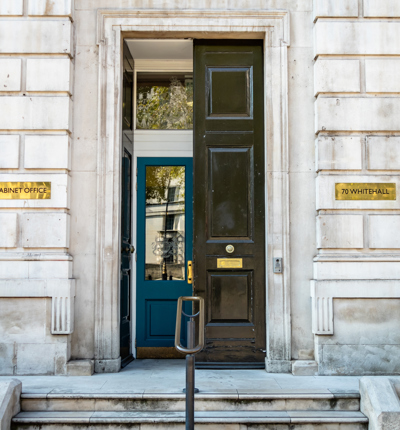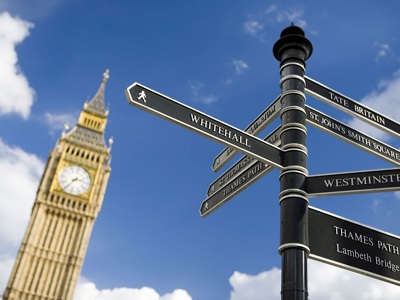
Government axes guidance that led to defence weapons expert Daniel Kaszeta being “no platformed” at international conference
The Government has dropped civil service guidance that was used to no-platform chemical weapons expert Dan Kaszeta from an international conference.
Posted on 25 July 2023
Following an unreserved apology to Mr Kaszeta on July 7, the Government Legal Department (GLD) now states that guidance laying out checks on outside speakers has been suspended pending a review.
The apology was received from conference hosts the Defence Science and Technology Laboratory (DSTL) after Mr Kaszeta legally challenged the use of the guidance against him.
In a letter to Mr Kaszeta’s legal team at law firm Leigh Day, the Government Legal Department (GLD) says Minister for the Cabinet Office, Jeremy Quin MP decided as of 19 July 2023 to withdraw both the 2022 Guidance on learning and events in the Cabinet Office (the 2022 Guidance) and 2021 Due Diligence and Impartiality – Supporting and Protecting Our Diversity Networks Guidance (the 2021 Guidance).
Both documents were used separately as justification by DSTL, an arms-length taxpayer funded body supervised by the Ministry of Defence, for disinviting Dan Kaszeta to its International Chemical Weapons Demilitarisation Conference a month before the event took place in London in May.
Mr Kaszeta was told he had been disinvited because a check on his social media made in accordance with Cabinet Office rules had identified material that criticised government officials or policy. In legal correspondence, the Government first said a check had been made under the 2021 Guidance, then later admitted that individuals in the DSTL had blacklisted Mr Kaszeta based on unpublished 2022 Cabinet Office guidance, which was leaked to the press in August 2022.
The 2021 guidance was only published on 17 May 2023 after it was referenced by Mr Quin in the Commons saying: “Taxpayers’ money should not unwittingly be used to pay for speakers linked to abhorrent organisations or individuals who promote hate or discriminatory beliefs, which could bring the civil service into disrepute. . . there are certain abhorrent organisations that we should not pay or give a platform to and cause embarrassment to our civil service or our country.” The 2022 Guidance which has now been withdrawn was never published.
Mr Kaszeta believes both the 2021 and 2022 Guidance and their application in his case were unlawful. In his legal letters to the DSTL and the Cabinet Office, he claimed the guidance was discriminatory on grounds of belief contrary to s.13 Equality Act 2010 and amount to violations of his right to freedom of thought, conscience and religion and right to freedom of expression (protected by Articles 9 and 10 of the European Convention respectively) both alone and when read with Article 14 (which prohibits discrimination). It is also argued the 2021 and 2022 Guidance were contrary to Mr Kaszeta’s rights under data protection law.
Government lawyers say Mr Quin does not believe the guidance is unlawful, but is concerned it is confusing and may be applied inaccurately. He said it was “rightly developed to ensure that cross-Government Diversity Networks for civil servants, and Cabinet Office officials, conduct checks to avoid any invitations being issued to individuals or organisations which might call into question the impartiality of the Civil Service”. It is understood a review is now under way and that new guidance is intended to be issued in the Autumn.
In a letter to Mr Kaszeta’s legal team at law firm Leigh Day, the Government Legal Department (GLD) says Minister for the Cabinet Office, Jeremy Quin MP decided as of 19 July 2023 to withdraw both the 2022 Guidance on learning and events in the Cabinet Office (the 2022 Guidance) and 2021 Due Diligence and Impartiality – Supporting and Protecting Our Diversity Networks Guidance (the 2021 Guidance).
Both documents were used separately as justification by DSTL, an arms-length taxpayer funded body supervised by the Ministry of Defence, for disinviting Dan Kaszeta to its International Chemical Weapons Demilitarisation Conference a month before the event took place in London in May.
Mr Kaszeta was told he had been disinvited because a check on his social media made in accordance with Cabinet Office rules had identified material that criticised government officials or policy. In legal correspondence, the Government first said a check had been made under the 2021 Guidance, then later admitted that individuals in the DSTL had blacklisted Mr Kaszeta based on unpublished 2022 Cabinet Office guidance, which was leaked to the press in August 2022.
The 2021 guidance was only published on 17 May 2023 after it was referenced by Mr Quin in the Commons saying: “Taxpayers’ money should not unwittingly be used to pay for speakers linked to abhorrent organisations or individuals who promote hate or discriminatory beliefs, which could bring the civil service into disrepute. . . there are certain abhorrent organisations that we should not pay or give a platform to and cause embarrassment to our civil service or our country.” The 2022 Guidance which has now been withdrawn was never published.
Mr Kaszeta believes both the 2021 and 2022 Guidance and their application in his case were unlawful. In his legal letters to the DSTL and the Cabinet Office, he claimed the guidance was discriminatory on grounds of belief contrary to s.13 Equality Act 2010 and amount to violations of his right to freedom of thought, conscience and religion and right to freedom of expression (protected by Articles 9 and 10 of the European Convention respectively) both alone and when read with Article 14 (which prohibits discrimination). It is also argued the 2021 and 2022 Guidance were contrary to Mr Kaszeta’s rights under data protection law.
Government lawyers say Mr Quin does not believe the guidance is unlawful, but is concerned it is confusing and may be applied inaccurately. He said it was “rightly developed to ensure that cross-Government Diversity Networks for civil servants, and Cabinet Office officials, conduct checks to avoid any invitations being issued to individuals or organisations which might call into question the impartiality of the Civil Service”. It is understood a review is now under way and that new guidance is intended to be issued in the Autumn.

Mr Kaszeta, an internationally renowned expert in defence against chemical, biological, radiological and nuclear weapons and warfare, and an Associate Fellow at the Royal United Services Institute, says the climbdown is a complete vindication for his challenge to the disinvitation and the guidance itself.
However, according to the latest GLD letter eight other Government departments have adopted
due diligence guidance, which Mr Kaszeta is questioning. He has been informed that those departments are Department for Business & Trade; Department for Digital, Culture Media & Sport; the Department for Levelling Up, Housing & Communities; the Department for Transport, the Department for Health & Social Care, HM Revenue & Customs, the Home Office and the Ministry of Justice. Departments who have informed the Cabinet Office they do not have due diligence guidance are the Department for Education, the Department for Science, Innovation & Technology and the Ministry of Defence. The Government have failed to admit whether the Foreign Office, Department for Work and Pensions, Department for Energy and DEFRA have too adopted the due diligence guidance.
Mr Kaszeta’s legal team at law firm Leigh Day are concerned that the further unpublished guidance in use by other Government departments may also be unlawful and that elsewhere civil servants are carrying out informal checks on external speakers without any legal basis to do so. As Mr Kaszeta’s legal action continues, his lawyers are seeking urgent disclosure of guidance in use by other Government departments and confirmation of what other informal checks on social media are being carried out.
Dan Kaszeta said:
“This is a substantive victory. Not one but two troublesome policies have been withdrawn. However, our work continues. We need to see how deep this goes. We still do not know the full extent. We do not know how many people were affected or how much valuable advice has been denied to government audiences. Clearly, there are people who deserve an apology that is as thorough as the one I received and I hope such apologies are forthcoming.”
Mr Kaszeta is represented by Leigh Day partner Tessa Gregory, who said:
“The withdrawal of both sets of due diligence Guidance by the Cabinet Office is complete vindication for our client who was unlawfully vetted by an arms-length body sponsored by the Ministry of Defence. However, we remain concerned that similar unpublished policies are being applied across government, and that there are widespread informal and formal practices emerging of Government officials vetting individuals for previous criticism of the Government. This undermines the impartiality of the civil service, it breaches Data Protection law and will lead to discrimination on the basis of political or philosophical beliefs contrary to the Human Rights Act and Equality legislation.”
Liberal Democrat Parliamentary Candidate Edward Lucas, who first publicised Mr Kaszeta’s case, said:
“Secret blacklists imposed at unaccountable, un-minuted meetings are redolent of Soviet-era eastern Europe. We have highlighted and overturned this threat to our freedom though a potent combination of media pressure, parliamentary questions and the threat of legal action. The government says it is concerned about threats to free speech from cancel culture and groupthink in banks, universities and elsewhere. Yet it was practising just what it denounces.”
Ben Collins KC of Old Square Chambers, Jane Russell of Essex Court and George Molyneaux of Blackstone Chambers are instructed.
Dan Kaszeta is continuing to crowdfund his legal challenge to the Government’s diversity guidance.
However, according to the latest GLD letter eight other Government departments have adopted
due diligence guidance, which Mr Kaszeta is questioning. He has been informed that those departments are Department for Business & Trade; Department for Digital, Culture Media & Sport; the Department for Levelling Up, Housing & Communities; the Department for Transport, the Department for Health & Social Care, HM Revenue & Customs, the Home Office and the Ministry of Justice. Departments who have informed the Cabinet Office they do not have due diligence guidance are the Department for Education, the Department for Science, Innovation & Technology and the Ministry of Defence. The Government have failed to admit whether the Foreign Office, Department for Work and Pensions, Department for Energy and DEFRA have too adopted the due diligence guidance.
Mr Kaszeta’s legal team at law firm Leigh Day are concerned that the further unpublished guidance in use by other Government departments may also be unlawful and that elsewhere civil servants are carrying out informal checks on external speakers without any legal basis to do so. As Mr Kaszeta’s legal action continues, his lawyers are seeking urgent disclosure of guidance in use by other Government departments and confirmation of what other informal checks on social media are being carried out.
Dan Kaszeta said:
“This is a substantive victory. Not one but two troublesome policies have been withdrawn. However, our work continues. We need to see how deep this goes. We still do not know the full extent. We do not know how many people were affected or how much valuable advice has been denied to government audiences. Clearly, there are people who deserve an apology that is as thorough as the one I received and I hope such apologies are forthcoming.”
Mr Kaszeta is represented by Leigh Day partner Tessa Gregory, who said:
“The withdrawal of both sets of due diligence Guidance by the Cabinet Office is complete vindication for our client who was unlawfully vetted by an arms-length body sponsored by the Ministry of Defence. However, we remain concerned that similar unpublished policies are being applied across government, and that there are widespread informal and formal practices emerging of Government officials vetting individuals for previous criticism of the Government. This undermines the impartiality of the civil service, it breaches Data Protection law and will lead to discrimination on the basis of political or philosophical beliefs contrary to the Human Rights Act and Equality legislation.”
Liberal Democrat Parliamentary Candidate Edward Lucas, who first publicised Mr Kaszeta’s case, said:
“Secret blacklists imposed at unaccountable, un-minuted meetings are redolent of Soviet-era eastern Europe. We have highlighted and overturned this threat to our freedom though a potent combination of media pressure, parliamentary questions and the threat of legal action. The government says it is concerned about threats to free speech from cancel culture and groupthink in banks, universities and elsewhere. Yet it was practising just what it denounces.”
Ben Collins KC of Old Square Chambers, Jane Russell of Essex Court and George Molyneaux of Blackstone Chambers are instructed.
Dan Kaszeta is continuing to crowdfund his legal challenge to the Government’s diversity guidance.
Profile

Tessa Gregory
Tessa is an experienced litigator who specialises in international and domestic human rights law cases



